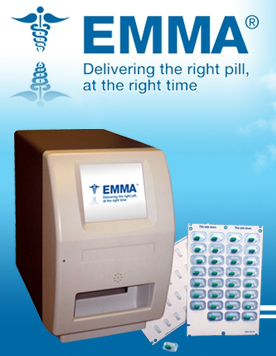If you pore over the towering columns of reports and studies detailing the mental wreckage wrought by combat, you keep seeing that drugs prescribed to heal, or ease pain, are a double-edged sword. Just like a surgeon’s scalpel poking around your chest, they can help as well as hurt. There is a constant battle to keep track of the potent pharmaceuticals prescribed to wounded troops, and to ensure they are getting the right doses at the right times.
There’s a weapon the Marines want in their fight against drug-abusing Marines back from battle, but they can’t get permission to add it to their arsenal. What makes that fact even more surprising is that the Army is already using it.
It’s called the Electronic Medication Management Assistant. EMMA, for short. It’s basically a locked safe full of powerful drugs that can dispense them at specific times, or when needed, by a doctor, nurse or other medical professional far away.
The Marines tending to the long-term wounded at Camp Lejeune would like to enlist EMMA in their efforts to keep wounded Marines medicated, but not over-medicated.
But, as a recent Pentagon inspector general’s report notes:
The EMMA system is a computerized medication dispenser for either inpatient or outpatient use. The system is programmed by the patient’s healthcare provider and can dispense individual doses of 10 different drugs for up to a month’s supply. Prescriptions and refills are prepared in blister cards dispensed by a pharmacy to the patient; the cards are then loaded into the dispenser…
The Commanding Officer explained that he along with selective staff members were briefed on the Electronic Medication Management Assistant (EMMA) in early 2010 and were convinced of its application for “high-risk” and vulnerable wounded warriors. He further explained that EMMA has not been approved by the Navy Bureau of Medicine and Surgery (BUMED), therefore, has not been implemented…
The EMMA system allows for a single dose of medication to be dispensed at a specific time and could be used in a Warrior’s room. A benefit of this system is that it limits the number of pills/capsules that are available to a Warrior at any one time. Although the advantage of using such a system was supported by both Battalion and hospital staff, the Battalion expressed their frustration that they had been unable to get approval from Navy Medicine to use EMMA. Even though Army units such as at Fort Bragg were using EMMA, the Battalion staff explained that Navy Medicine was concerned whether EMMA would be HIPAA compliant and allowable.
The Army, in fact, issued an “urgent” contract for EMMAs to be sent to “Walter Reed Army Medical Center, Washington, DC, Womack Army Medical Center, Ft. Bragg, NC, Madigan Army Medical Center, Ft. Lewis, WA and Evans Army Medical Center, Ft. Carson, CO” nearly three years ago. Army Secretary John McHugh praised EMMA last year for creating an Army pill-delivery system “where you can only get one dose at the proper time” to help “ensure soldiers are not becoming addicted.”
Just another data point into the decades-old debate about the wisdom of combining the military services’ separate medical branches into one defense-wide operation. Unless you think, of course, that wounded Marines require a different kind of care than wounded soldiers. But that makes no sense: they both bleed green. Just different shades.



